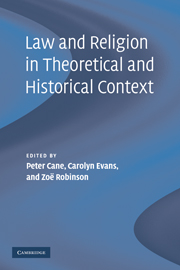Book contents
- Frontmatter
- Contents
- List of Contributors
- 1 Introduction
- 2 The moral economy of religious freedom
- 3 Understanding the religion in freedom of religion
- 4 Why religion belongs in the private sphere, not the public square
- 5 Pluralism in law and religion
- 6 The influence of cultural conflict on the jurisprudence of the religion clauses of the First Amendment
- 7 From Dayton to Dover: the legacy of the Scopes Trial
- 8 A very English affair: establishment and human rights in an organic constitution
- 9 Days of rest in multicultural societies: private, public, separate?
- 10 Australian legal procedures and the protection of secret Aboriginal spiritual beliefs: a fundamental conflict
- 11 Secular and religious conscientious exemptions: between tolerance and equality
- 12 Law's sacred and secular subjects
- 13 Freedom of religion and the European Convention on Human Rights: approaches, trends and tensions
- Index
- References
4 - Why religion belongs in the private sphere, not the public square
Published online by Cambridge University Press: 07 July 2009
- Frontmatter
- Contents
- List of Contributors
- 1 Introduction
- 2 The moral economy of religious freedom
- 3 Understanding the religion in freedom of religion
- 4 Why religion belongs in the private sphere, not the public square
- 5 Pluralism in law and religion
- 6 The influence of cultural conflict on the jurisprudence of the religion clauses of the First Amendment
- 7 From Dayton to Dover: the legacy of the Scopes Trial
- 8 A very English affair: establishment and human rights in an organic constitution
- 9 Days of rest in multicultural societies: private, public, separate?
- 10 Australian legal procedures and the protection of secret Aboriginal spiritual beliefs: a fundamental conflict
- 11 Secular and religious conscientious exemptions: between tolerance and equality
- 12 Law's sacred and secular subjects
- 13 Freedom of religion and the European Convention on Human Rights: approaches, trends and tensions
- Index
- References
Summary
The role that it is appropriate for religion to play in politics is a subject of great controversy. In this paper I wish to defend the claim that religion should be regarded as a private matter. I will argue for three principles of political morality: that the government should not act on religious purposes; that it should not assist religious groups to spread their religious beliefs; and that arguments based solely on religious convictions should not be offered as reasons for laws and public policies. The first two principles apply to the relations between church and state, whereas the third principle governs the conduct of individuals. A further difference is that the first two principles are offered as guides to appropriate law in a liberal democracy, whereas the third principle sets out to delineate the moral duties of citizens when contributing to public discourse and it is not suggested in this paper that legal effect should be given to it.
Though the insulation of religion from politics provides a very strong guarantee of religious liberty and toleration, it is nevertheless true that the three principles I propose treat religion less favourably, on the whole, than non-religion. In what follows I will present some reasons for thinking that it is justifiable to subject religion to these disadvantages and I will argue, in addition, that these reasons can and should be found acceptable by both believers and non-believers.
- Type
- Chapter
- Information
- Law and Religion in Theoretical and Historical Context , pp. 44 - 71Publisher: Cambridge University PressPrint publication year: 2008
References
- 4
- Cited by

